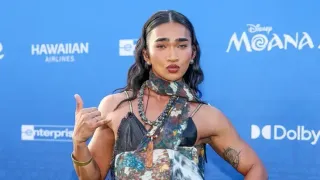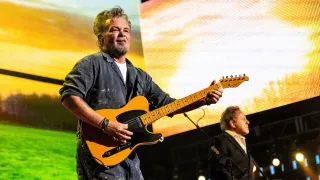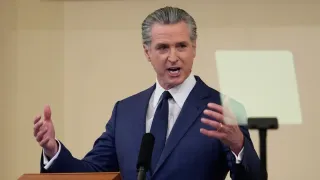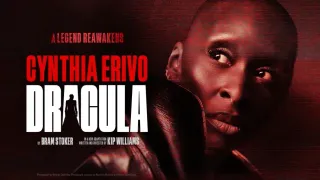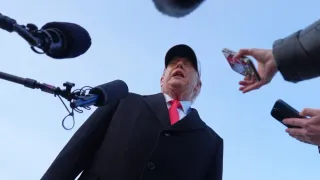June 14, 2022
Stories from OutWrite: Holding Queer Histories and Queer Bodies
Julie R. Enszer READ TIME: 6 MIN.
Scrolling Facebook, I see snapshots posted by a friend and recognize Essex Hemphill immediately. Hemphill, a Black gay poet featured in the films "Looking for Langston" and "Tongues Untied," is aglow, his charisma leaps from illuminated pixels and grabs my eyeballs.
The image, posted by my colleague, the literary publicist Michele Karlsberg, is simultaneously staged and spontaneous. Staged because Michele clearly said to some passerby as she shoved her camera into their hands, 'Here, would you take a quick picture of us?' She then rushed to Essex's side while Blackberri, the man on the left, put his arm around Essex, and they all smiled for the impromptu photographer.
Essex, though, in the exuberance of conference activity, in the excitement of seeing his friends and comrades Blackberri and Michele, kept talking, and the picture memorializes him mid-sentence with a toothy grin that appears as a smile, but leaves me wondering, what was he telling the group? Is he bantering with the people in the picture or with the camera operator? Or maybe he is hailing someone else walking by at that moment, saying, 'Come join us.' The moment of the snapshot is dynamic and active, the buzz of conference energy is all around them and emanates from the photograph.
Great Gathering
Although the conference name tags are a bit difficult to read in the image, I recognize the OutWrite 92 logo with a hand holding an exclamation point which doubles as a pen. OutWrite was a conference organized first by OUT/LOOK magazine in San Francisco and later by Gay Community News in Boston. The conferences were held annually between 1990 and 1999. This OutWrite was the first held in Boston.
Over 2000 people attended, welcomed with opening plenary speeches by Mariana Romo-Carmona and Dorothy Allison and a closing plenary featuring Melvin Dixon and Allan Gurganus.
In a snapshot of a moment at the conference, Michele sports dyke haircut #1, while Blackberri nods to international solidarities with a keffiyeh and a central American ikat jacket.
Essex rocks a baseball cap. He must have been basking at this conference. Alyson published "Brother to Brother" in 1991. Essex completed the editorial work for this groundbreaking collection of literary writing by Black gay men, after Joseph Beam died in 1988 from complications of AIDS.
Essex's next book, "Ceremonies," was scheduled for publication on June 1, 1992; he may have had galleys with him at the conference. It was a moment when the gay and lesbian world wanted to hear his voice, and everyone hoped perhaps the broader public did as well. These observations about the business of publishing, while important, are secondary to the snapshot. In that moment, I like to imagine no one thinking about work, and everyone just smiling for the camera, enjoying that camaraderie of gathering with friends.
Shaping Literary Culture
The second photo from Michele's trove frames Michele and Melvin Dixon. I love this photo for narcissistic reasons. While I never attended OutWrite, I can see myself in this this snapshot. My younger self physically bears resemblance to Michele in body type, haircut, and facial features. The woman over Melvin's shoulder, again with dyke haircut number one, looks eerily like a younger me, like a sister to us both.
Melvin Dixon is the star of this photograph with that large wide smile, grasping a manuscript or maybe a photo album in his arms. He would not have made his conference speech yet. This photo does not convey that he was ill during the conference. On Sunday, March 22, 1992, he told the audience, "I may not be well enough or alive next year to attend the lesbian and gay writers conference, but I'll be somewhere listening for my name." He was correct, and his challenge to remember and preserve gay literary history remains.
With my colleague Elena Gross, I have been busy preserving LGBTQ literary history through the new book, "OutWrite: The Speeches that Shaped LGBTQ Literary Culture." Elena Gross and I argue in our introduction to the collection that these gatherings shaped LGBTQ literary culture and remain relevant to today's literary communities.
While we write about the history of the conferences and compile some of the significant speeches from the conference, three snapshots from Michele capture something more intimate about what the conferences meant, and about what it means to build LGBTQ communities of care.
Fragile Unions
The third photograph is of Melvin from the same event hugging Jewelle Gomez. Firebrand Books published Jewelle's "The Gilda Stories," an American odyssey about slavery and vampires, in 1991. Like Essex, her reputation was growing.
In this photo, Jewelle leans into Melvin reminding us of Melvin's stature. The intimacy between Jewelle and Melvin in this snapshot reminds of me of Joan Nestle writing about a photo session that she and John Preston had in Boston at OutWrite 93 for a publicity shot for their forthcoming book "Sister & Brothers: Lesbians & Gay Men Write about Their Lives Together" (HarperSanFrancisco, 1994).
Nestle writes, "Huddled against the November wind, John and I positioned ourselves on a bench, trying to find poses with which we both felt comfortable. Finally I gave up trying to find the pose that would not call up stereotypical male-female images and just let my body find its own position.
"I knew I wanted to hold John, for my own self, and so I raised myself up and held his head against my breast. Immediately, I became aware of his fever, of the heat emanating from his body. Several months later when I saw the finished photos, I was struck by how our hands had found a way to hold on to each other's bodies ('John Preston and Myself,' 'A Fragile Union')."
Joan's writing about John captures the intimacy and fragility of the personal connections made at OutWrite conferences, ten magical years of gatherings of LGBTQ writers. These conferences provided a way for queer people, embattled by larger societal forces, to find a way to hold on to each other's bodies through defeats and illnesses as well as triumphs and creations.
"OutWrite: The Speeches that Shaped LGBTQ Literary Culture" celebrates these histories and reminds us to find a way to continue to hold on to each out, to our words, to our stories, to our bodies.
Joseph Beam died on December 27, 1988 at the age of thirty-three.
Melvin Dixon died on October 26, 1992 at the age of forty-two.
John Preston died on April 28, 1994 at the age of forty-nine.
Essex Hemphill died on November 4, 1995 at the age of thirty-eight.
Blackberri died on December 13, 2021 at the age of seventy-six.
A book event for 'OutWrite: The Speeches that Shaped LGBTQ Literary Culture' with co-editors Elena Gross and Julie Enszer, and writers Jewelle Gomez and Marvin K. White, will take place at the Museum of the African Diaspora, June 23, 6:30pm. 685 Mission St. at 3rd. www.moadsf.org
Help keep the Bay Area Reporter going in these tough times. To support local, independent, LGBTQ journalism, consider becoming a BAR member.
